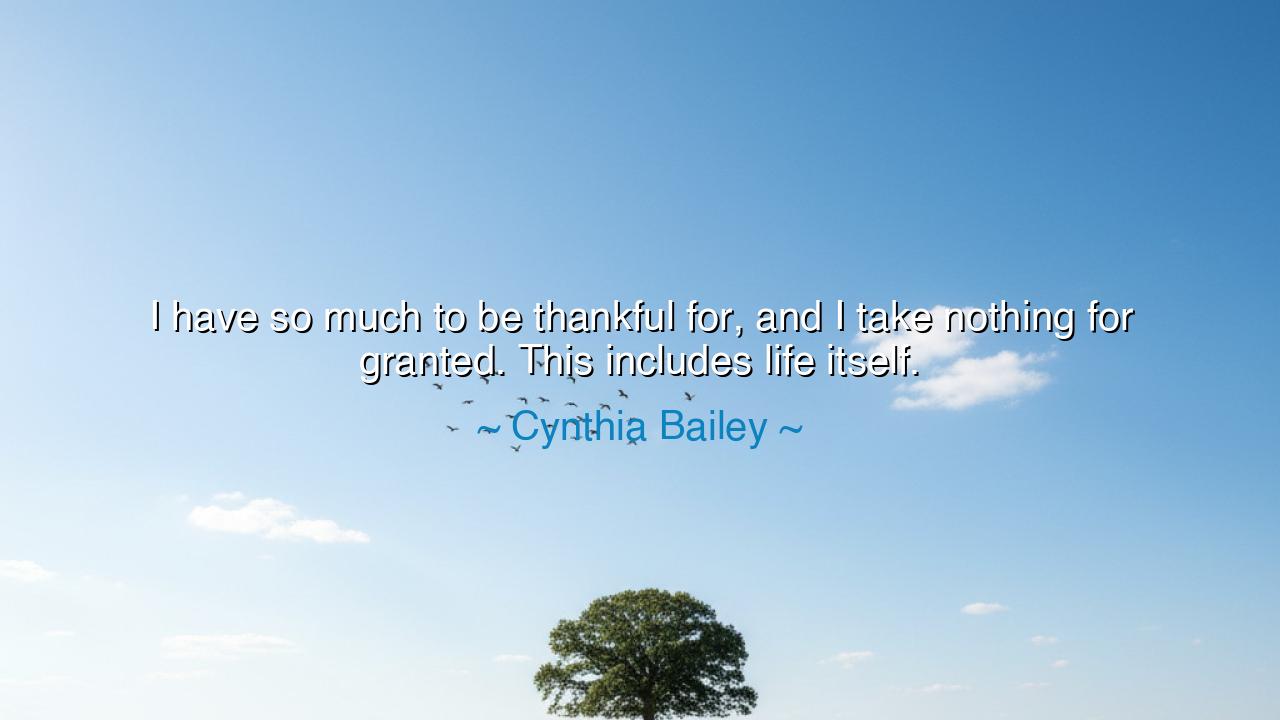
I have so much to be thankful for, and I take nothing for
I have so much to be thankful for, and I take nothing for granted. This includes life itself.






Hearken to the words of Cynthia Bailey, who declared with a spirit both humble and mighty: “I have so much to be thankful for, and I take nothing for granted. This includes life itself.” In this utterance is no idle remark, but a truth forged in the furnace of human experience. It is the voice of one who has walked through both shadow and light, who has come to understand that the most precious gift is not wealth, not fame, not even victory, but the sheer breath of existence itself.
The first light of her saying is thankfulness. She speaks not of a single triumph nor a single blessing, but of “so much,” as though her life overflows with unseen treasures. To live with such a spirit is to walk through the world with open eyes, to see the wonders others miss. Gratitude transforms even the smallest portion into abundance. It is the bread that never runs dry, the cup that overflows because the heart sees not what is lacking but what is already given.
The second flame is the refusal to take things for granted. Many men and women stumble here, for they awaken each morning believing life owes them another day. They assume the rising sun is their entitlement, that love, family, breath, and chance will always remain. But the wise know otherwise. To take nothing for granted is to live with reverence, to treat each moment as holy ground. The ancients themselves spoke of memento mori—remember you must die—not to inspire dread, but to awaken men to the sacredness of the present hour.
Her final emphasis is upon life itself, the primal gift. All honors, all fortunes, all joys are but adornments upon this single, unpurchasable treasure. To value life is to resist the dullness of routine and the poison of despair. It is to walk as though each breath were a miracle, each sunrise a new covenant, each heartbeat the echo of eternity. When one sees life in this way, then gratitude is not forced but natural, rising like a song from the soul.
History bears witness to this truth. Consider the tale of Anne Frank, the young girl hidden away during the darkness of war. Though confined, endangered, and stripped of worldly comforts, she wrote in her diary of beauty, of hope, of faith in humanity’s goodness. Even when life was reduced to its barest form, she cherished life itself. Her words endure because they are rooted in the same truth Cynthia Bailey spoke: gratitude even in hardship, reverence even for the breath of existence.
The lesson, then, is plain but profound: if you would live wisely, live with thankfulness. Take nothing for granted, not even the gift of rising from your bed. Cherish your loved ones as though each meeting were your last. Celebrate the common wonders—water on your lips, laughter in your ears, the strength of your body, the fire of your spirit. For when the end comes, these will be revealed as the true treasures of your journey.
As for practical guidance, begin each day by naming aloud three things for which you are thankful. Let one of them always be life itself, that you might never forget the miracle of existence. Walk slowly at times, noticing the wind, the light, the sound of your own breath. When you speak to others, let gratitude guide your tongue. And when hardships arise, remember: even the chance to endure them is itself proof that life remains with you.
Thus, Cynthia Bailey’s words shine not only as a personal reflection, but as an eternal teaching: be thankful, take nothing for granted, honor life itself. For in such a spirit, joy is made fuller, sorrow is made bearable, and the path of existence is revealed as the sacred pilgrimage it has always been.






AAdministratorAdministrator
Welcome, honored guests. Please leave a comment, we will respond soon